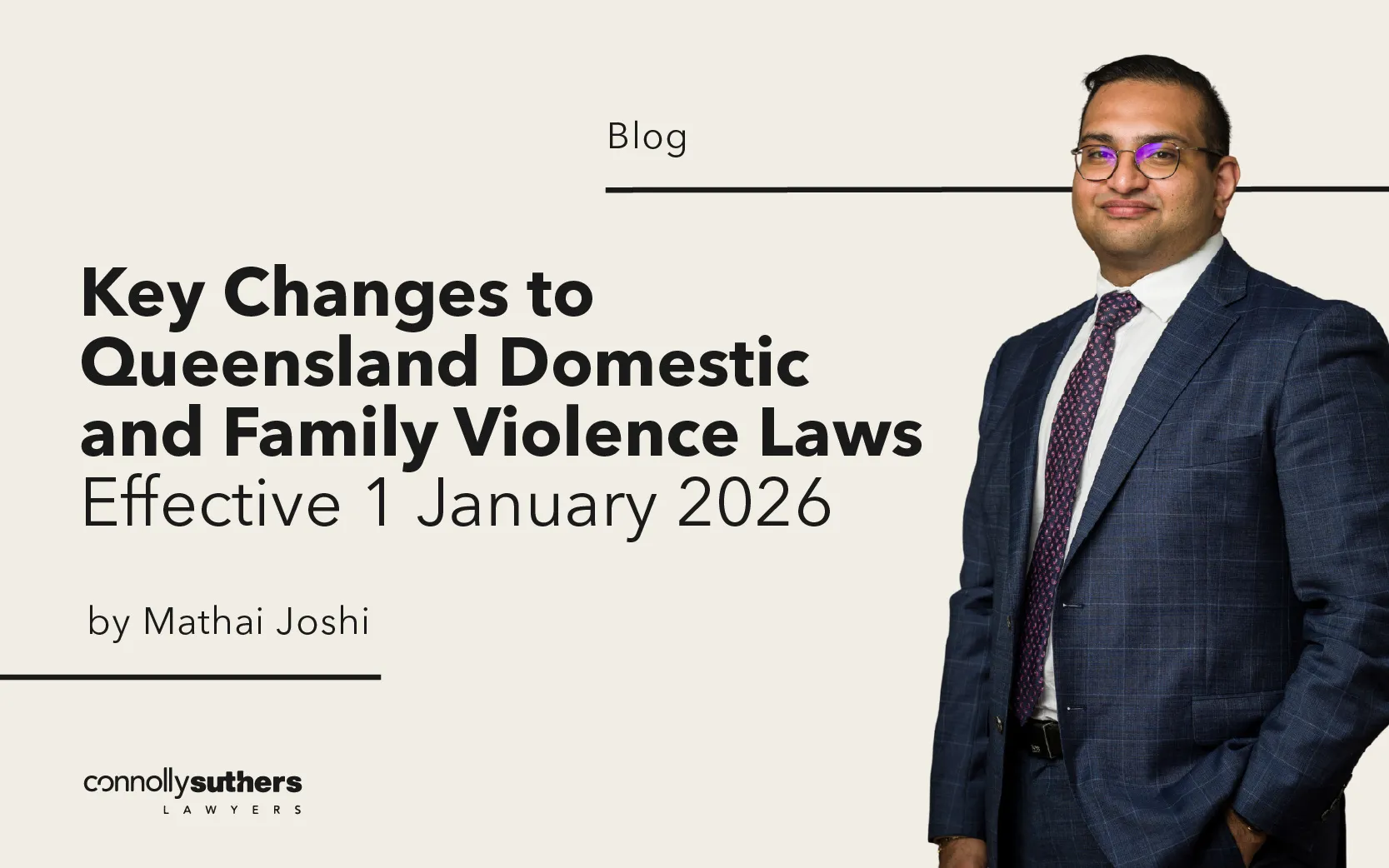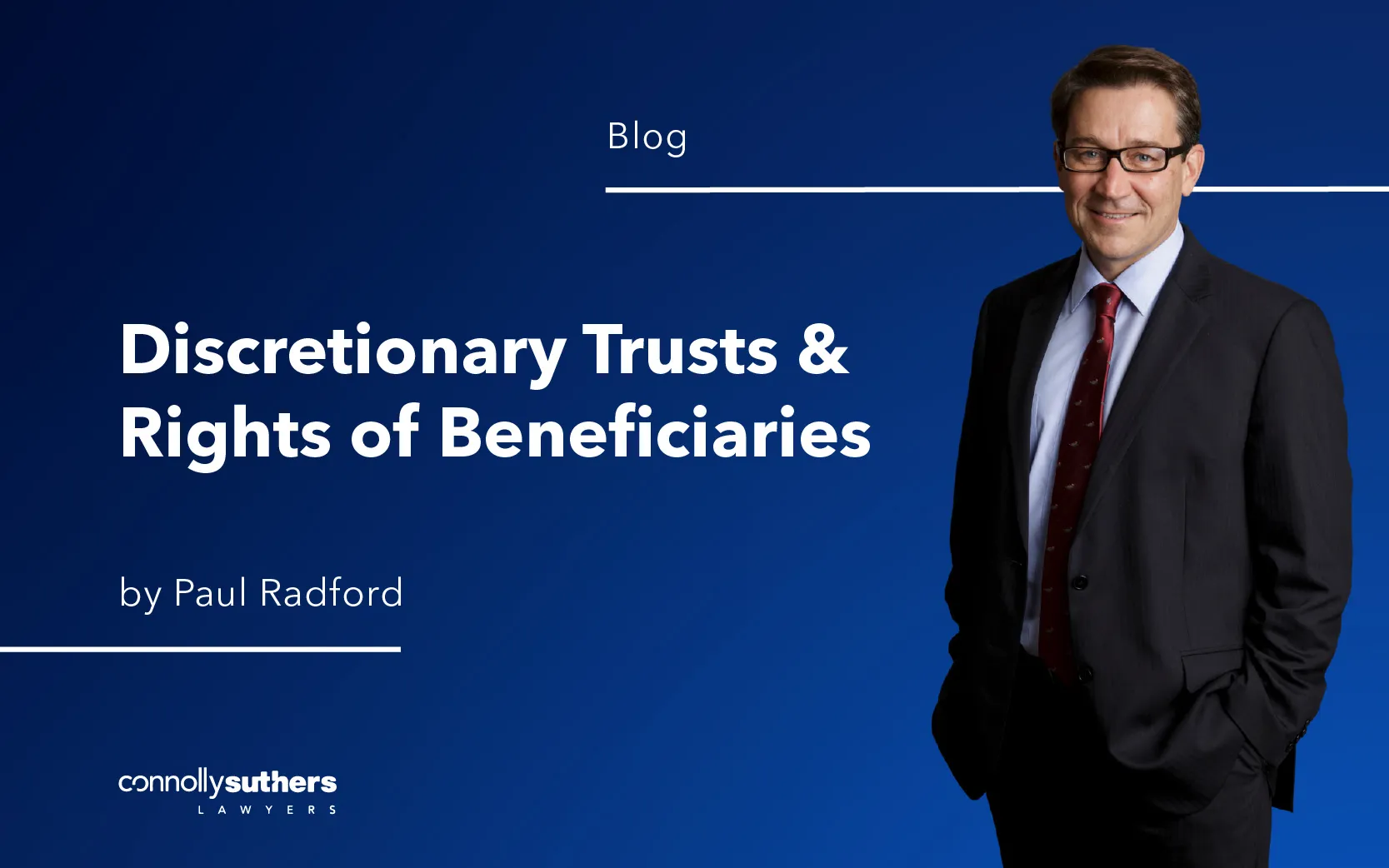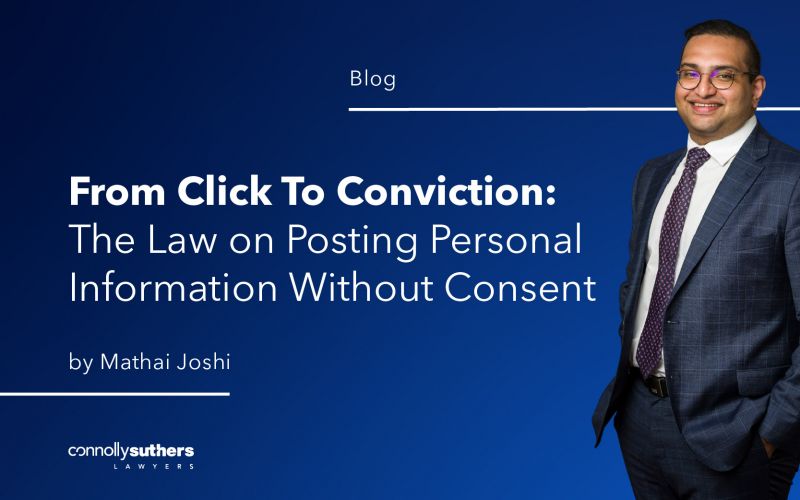Latest Legal Blogs

Key Changes to Queensland Domestic and Family Violence Laws Effective 1 January 2026
The commencement of the new year brings significant changes to Queensland’s Domestic and Family Violence (DFV) legislative framework. Many of these reforms are designed to strengthen early intervention and improve protections for victims of domestic violence. We previously discussed several of these anticipated reforms in our 2025 article, Proposed Changes to Queensland Domestic Violence Law – What Do These New Changes Mean? (read here). One of the most notable changes taking effect from 1 January 2026 is the introduction of Police Protection Directions (PPDs). What Is a Police Protection Direction (PPD)? From 1 January 2026, Queensland Police will have the power to issue a Police Protection Direction (PPD) in certain domestic violence situations. A PPD is a legally enforceable direction that sets out conditions a respondent must comply with. Importantly, police can issue a PPD without first applying to the court for a Police Protection Order. Once served, a PPD can remain in force for up to 12 months. Failure to comply with the conditions of a PPD is a criminal offence, and a respondent may be charged for contravening the direction. When Can Police Issue a PPD? A police officer may issue a PPD where they reasonably believe that: The respondent and the aggrieved are in a relevant relationship; The respondent has committed an act of domestic violence against the aggrieved; The PPD is necessary and desirable; and It would not be more appropriate for a protection order application to be made directly to the court. The purpose of PPDs is to allow police—who are often the first responders—to provide immediate protection and support to victims of domestic violence. These directions are intended to streamline the protection process and reduce delays associated with court applications. When Can Police Not Issue a PPD? Although PPDs are designed to simplify the protection process, they are not intended to replace the court system in all cases. Police are prohibited from issuing a PPD in certain circumstances, including where: The aggrieved or respondent is a child or a police officer; The respondent should be taken into custody for the domestic violence incident; There is, or has previously been, a protection order or interstate order between the same parties; There is, or has previously been, a PPD against the respondent; The respondent has been convicted of a domestic violence offence within the past two years; There is an unresolved criminal domestic violence proceeding against the respondent; There is an unresolved application for a protection order before the court; The respondent used, or threatened to use, a weapon or object; Police believe both parties require protection but cannot determine who is most in need; or Police believe a child requires additional protection that cannot be adequately addressed by a PPD. When Does a PPD End? A PPD remains in force for 12 months from the date it is served or verbally issued by police. A PPD may end earlier if: Police or a court revokes the PPD; A Protection Order (DVO) or Police Protection Notice is issued for the same parties; An application for a protection order is filed in court for the same parties; or An application for a protection order is dismissed or adjourned without a temporary protection order being made. What Should You Do If You Are Served With a PPD? If you have been served with a PPD and do not agree with the direction or its conditions, you may seek a review in one of two ways: Police Review Court Review It is essential to obtain legal advice before choosing a review pathway, as each option carries different legal and practical consequences. Police Review A respondent may apply for a police review within 28 days of being served with a PPD. The application must be lodged with the Queensland Police Service using the approved form. If the application is filed outside the 28-day timeframe, an extension must be sought and will be considered at the discretion of the reviewing officer. Following the review, police may decide to: Confirm the PPD; Revoke the PPD with no further action (meaning it is taken never to have existed and will not form part of the respondent’s DV history); Revoke the PPD and issue a new PPD with amended conditions; Revoke the PPD and apply for a protection order or issue a Police Protection Notice; or Take other action under section 100(3) of the Domestic and Family Violence Protection Act. Court Review Alternatively, a respondent may apply to the Magistrates Court for a review of the PPD. During the court review process, the PPD remains in force, and all conditions must be strictly complied with. Once a court review application is filed, police will automatically file the PPD as an application for a protection order against the respondent. The court may then: Make a final protection order (typically for five years); Make a temporary protection order while the matter is determined; or Determine the outcome of the PPD review. In these circumstances, the PPD will end. The court may also: Order that the PPD end on a specified date (remaining on the respondent’s DV history); Set aside the PPD entirely (removing it from the respondent’s DV history); or Dismiss the review application, allowing the PPD to continue. Seek the Right Legal Advice Queensland’s Domestic and Family Violence laws are complex and have undergone substantial reform in recent years. If you have been served with a Police Protection Direction or approached by police regarding a domestic violence matter, obtaining timely legal advice is critical. While the issuance of a PPD or protection order is not itself a criminal offence, breaching the conditions is, and can result in serious criminal consequences. These orders may also impact employment, professional licensing, blue card eligibility, and weapons licences. Contact our Criminal Law team today via (07) 4771 5664 or submit a Criminal Law Enquiry via the form at the end of this page. The team at Connolly Suthers has extensive experience in Domestic and Family Violence matters and regularly appears in the Domestic Violence Specialist Court to assist clients navigating these complex issues.

Can you defend your home from an intruder? Understanding Queensland’s defence of dwelling
Home invasions are something no one wants to experience. With concerns about youth crime and property breaks-ins on the rise, many Queenslanders are asking: What can I legally do if someone breaks into my house? Can I fight back? And if so, how far can I go? The answer lies in section 267 of the Criminal Code Act 1899 (Qld) (‘the Criminal Code’) – commonly known as Defence of Dwelling. What is defence of dwelling? Under Queensland law, it is lawful for a person in peaceable possession of a dwelling, and any person lawfully assisting him or her or acting by his or her authority, to use force to prevent or repel another person from unlawfully entering or remaining in the dwelling, if the person using the force believes on reasonable grounds— the other person is attempting to enter or to remain in the dwelling with intent to commit an indictable offence in the dwelling; and it is necessary to use that force.[1] What does this mean in practice? In Queensland, an occupier may use force they believe is necessary, provided that belief is held on reasonable grounds. This is not the same as requiring the force itself to be “reasonable”. The question is whether the occupier actually held the belief, and whether there were reasonable grounds for it, even if others might think it was wrong or misguided. This threshold offers Queenslanders confidence in their rights to defend their home, however, it is not a free pass to slaughter every trespasser. History behind the defence The idea that “a man’s home is his castle” goes back centuries. It was famously recognised in Semayne’s Case in 1604, which described the home as a fortress.[2] Section 267 of the Criminal Code was modernised in 1997 in response to growing community concerns about home invasions. Before that, the law only applied to “forcible breaking and entering of the dwelling house”. The current version covers any unlawful entry or remaining in a dwelling, provided you believe the intruder intends to commit an indictable offence therein. More recently, there has been political debate about whether the law should go further. In 2024, the Criminal Code (Defence of Dwelling and Other Premises – Castle Law) Amendment Bill 2024 was introduced to Queensland Parliament. The objective of this Bill is to broaden the circumstances in which an individual can lawfully respond to a home invasion with such force that it may result in grievous bodily harm or death to the intruder. Whilst the Bill has not passed, it has sparked significant public interest and is likely to continue generating debate about the appropriate limits of force in defence of the home. Breaking down the elements of the defence There are 4 elements to defence of dwelling. Importantly, the defendant bears the evidentiary burden to raise or point to evidence capable of supporting the availability of the defence. This is assessed on the balance of probabilities, which is a lower standard of proof. Once this burden is met, the legal burden shifts to the Prosecution, who must then disprove at least one element of the defence beyond reasonable doubt, a significantly higher threshold. Element 1 The first element is satisfied where the defendant was in peaceable possession of a dwelling or was lawfully assisting or acting by the authority of a person in peaceable possession of a dwelling. The term “dwelling”, in its summarised terms, refers to a building or structure, or part of a building or structure, kept by the owner or occupier for their residence and that of their family.[3] An area under a high-set house, where the laundry was located, has been held to fall within the meaning of dwelling,[4] as has a motel unit occupied by a person for a week,[5] and a caravan used for residential purposes.[6] However, a concrete pad on the ground between a house with a carport attached and a rear shed has been held not to be a structure or part of those buildings or structures.[7] This means that, for example, if someone were in your yard and you reasonably believed they were attempting to enter your dwelling to commit an indictable offence, the law may allow you to use force necessary to stop them. However, it is important to remember that every situation is different, and proving that belief can be more difficult where, for instance, you live on a large acreage and the person is not near the dwelling. In reality, the best and safest first step is always to contact Queensland Police Service immediately. If it is safe to do so from a distance, recording the intruder may help support your defence should the matter proceed to Court. The term “possession” includes ‘having under control in any place whatever, whether for the use or benefit of the person of whom the term is used or of another person, and although another person has the actual possession or custody of the thing in question.’[8] There is limited Australian authority on the meaning of “peaceable”. However, in determining whether possession is peaceable, Courts have considered factors such as whether the defendant was living in the dwelling in which the events occurred, and whether there is a dispute as to their entitlement to be there.[9] Element 2 The second element requires that the defendant used force for the purpose of preventing or repelling an intruder from unlawfully entering or remaining in the dwelling. If the victim is lawfully on the premises, defence of dwelling will not be available,[10] and the force used cannot be used as a form of vengeance. Regarding the degree of force used, it has been held that ‘section 267 might apply even if the defendant used more force than was reasonably necessary to make an effectual defence of his person or of others in the house against [the victim].’[11] In this way, defence of dwelling does not entrench a requirement of proportionality or reasonableness for the amount of force used. Elements 3 & 4 The third and fourth elements are often considered together given their subjective and objective components. The defendant must hold a subjective belief that the victim was attempting to enter or remain in the dwelling with intent to commit an indictable offence, and that their use of force was necessary to prevent this. The law further requires that the defendant’s subjective belief be based on reasonable grounds, thereby introducing an objective element.[12] Threatening violence has been found to be sufficient to form a reasonable belief.[13] Criminal offences comprise crimes, misdemeanours and simple offences. Crimes and misdemeanours are known as indictable offences, which may include stealing, unlawful use of a motor vehicle, or assault.[14] In determining whether the belief in the necessity of force was reasonably held, the jury must consider the circumstances as a whole; including the level of force used and the reality that a person defending their home may not be able to precisely weigh the best course of action.[15] It must also be acknowledged that ‘reasonable people in the accused’s situation might have held a variety of beliefs ... about the relevant state of affairs.’[16] Ultimately, Courts assess reasonableness based on the situation as it appeared to a person at the time, not with hindsight. The law also recognises that a person defending their home is not required to retreat from a threat, even where retreat might otherwise appear a reasonable option.[17] However, approaching an intruder should only ever be considered as a last resort. Protecting your own safety, and that of others in the dwelling, is paramount, and you can never know whether an intruder may be armed or in company. Scope of defence of dwelling Defence of dwelling is broader than self-defence and other property defences. It does not require the force used to be proportionate, and it does not exclude cases where grievous bodily harm or even death results.[18] Importantly, a person does not need to fear death or grievous bodily harm themselves to rely on the defence.[19] The absence of a proportionality requirement, while extending the ambit of the defence, may be justified on the basis that an occupant faced with a sudden home invasion cannot be expected to exercise fine judgment as to the exact level of force required. In principle, this means the defence can extend to lethal force, though only in the most significant circumstances. If an owner/occupier of a dwelling reasonably believes lethal force is necessary to prevent or repel an intruder from entering or remaining in the dwelling (provided they also reasonably believe the intruder intends to commit an indictable offence in the dwelling), the law can justify that use of force. The key question for the Court or jury is whether that belief was reasonable in all the circumstances and whether the force used was reasonably necessary. In R v Spajic [2011] QCA 232, the Queensland Court of Appeal dismissed an appeal against a conviction for manslaughter, on the ground that the jury could reasonably have found that the appellant did not believe, on reasonable grounds, that it was necessary to stab the deceased to prevent entry into the dwelling. After a trial, the jury acquitted the appellant of murder and instead convicted him of manslaughter. The evidence showed that the deceased had accompanied a friend to the appellant’s residence to help her recover property she believed was inside. Although the deceased was on the appellant’s verandah and knocking loudly on a window, he neither entered nor attempted to force entry into the appellant’s house, nor did he step inside when the appellant opened the door. An altercation arose, however, the deceased was unarmed, and it was the appellant who escalated the confrontation by arming himself with a knife and confronting the group on the verandah. Violence only broke out after the appellant threatened the deceased with the knife. In those circumstances, the requirements of defence of dwelling were not satisfied, and the appeal was dismissed. Get help from a criminal lawyer Whilst Queensland law recognises Defence of Dwelling, it applies in limited circumstances. If someone is on your property or attempting to enter your home, the safest and most appropriate course of action is to contact the Queensland Police Service immediately. If you have been charged with a criminal offence, it is important to seek timely and accurate legal advice from a lawyer who can advocate effectively for you in Court. At Connolly Suthers Lawyers, our experienced Criminal Law team provide clear, reliable advice and strong representation at every stage of the process. If you have any questions or need assistance, please contact us on (07) 4771 5664. This article is of a general nature and should not be relied upon as legal advice. If you require further information, advice or assistance for your specific circumstances, please contact Connolly Suthers Criminal Lawyers. [1] Criminal Code Act 1899 (Qld) s 267. [2] Semayne’s Case (1604) 77 ER 194, 195. [3] Criminal Code Act 1899 (Qld) s 1. [4] R v Bartram [2013] QCA 361, [19]-[20]. [5] R v Halloran and Reynolds [1967] QWN 34. [6] R v Rose [1965] QWN 35. [7] R v Richards [2023] QCA 7, [20]-[21]. [8] Criminal Code Act 1899 (Qld) s 1. [9] R v McMartin [2013] QCA 339, [23]. [10] Ibid. [11] R v Spajic [2011] QCA 232, [35], citing R v Cuskelly [2009] QCA 375, [27]. [12] R v O’Neill [2009] QCA 210, [16]; Murray v Grieve [2014] QDC 18, [58]. [13] R v Cuskelly [2009] QCA 375; R v Bartram [2013] QCA 361. [14] Criminal Code Act 1899 (Qld) s 3. [15] R v McMartin [2013] QCA 339, [23]. [16] R v O’Neill [2009] QCA 210, [16]. [17] R v Cuskelly [2009] QCA 375, [29], citing R v Hussey (1925) 18 Cr App R 160, 160-2. [18] R v McMartin [2013] QCA 339, [26]. [19] R v Cuskelly [2009] QCA 375, [27].

Is a Stepchild Eligible to Contest a Will in Queensland?
Is a stepchild eligible to contest a Will in Queensland? Eligibility criteria In Queensland, a stepchild has the same rights as a biological or adopted child to contest a Will provided the stepparent and the child’s natural parent did not divorce before the death of the stepparent. To be a stepchild (and eligible to contest the Will of the stepparent), the child’s natural parent and stepparent don’t have to be married. It applies if they are in a civil partnership or de facto relationship as well. In 2017, the law was amended to confirm that the child of a deceased’s civil partner or de facto partner falls within the definition of a stepchild. It is important to note that a stepchild remains eligible to contest the Will of the stepparent even when the stepparent remarries or enters into a de facto relationship or civil partnership after the death of the child’s natural parent provided that prior to the death of the child’s natural parent their relationship was not legally dissolved. Time frames for a stepchild to contest A stepchild who intends to contest a Will must do so within statutory time limits. The stepchild must notify the executor in writing of their intention to contest the Will within 6 months of the deceased’s death and they must file their Family Provision Application and commence proceedings within 9 months of the deceased’s death. Factors considered in a Family Provision Application While a stepchild in Queensland is eligible to contest a Will regardless of their age or dependence on the deceased, being successful in their claim for further provision from the deceased’s estate is a separate issue. The courts will look at a variety of factors when undertaking a Family Provision Application, such factors include: the financial and personal situation of the stepchild, the length, nature and closeness of the relationship between the stepchild and the deceased, the degree to which the stepchild was dependent on the deceased, competing claims (the claims and needs of other beneficiaries or applicants) and deceased’s reasons for excluding or minimising the stepchild’s share and the size of the deceased’s estate. Superannuation death benefits and stepchildren As to the eligibility of a stepchild to receive superannuation death benefits direct from the superannuation fund, a stepparent cannot nominate their stepchild as a beneficiary of their superannuation death benefits when the natural parent has predeceased or has divorced the stepparent. In such circumstances, the ATO has said that a stepchild is no longer entitled to receive death benefits directly from the superannuation fund unless the stepchild meets another definition as a dependant. Dying without a Will and stepchildren If a person dies without a Will, under Queensland’s Intestacy Laws, stepchildren are not automatically recognised as beneficiaries unless they qualify as a dependant in a Family Provision Application. If you would like assistance with any of the above information, please contact our Wills and Estates team via (07) 4771 5664.

Crimes Against The Elderly
Unconscionable, Criminal and Invisible Taking advantage of the old, frail and vulnerable members of society is more prevalent now than it ever was. People are living longer, they have more money and many are developing mental illnesses such as Alzheimer’s Disease.

Who Keeps The Pet?
Where you were married or in a de facto relationship, the Federal Circuit and Family Court (“the Court”) has jurisdiction to make orders regarding who gets ownership of pets following separation. Where parties can reach agreement about who is to keep the pet, an order for ownership of the pet can be included in property settlement orders. However, where parties cannot agree who is to keep the pet, the court can decide who gets ownership of the pet as part of property settlement. Previously, the Court viewed pets strictly as property and did not consider whether there was any attachment to the pet or what was in the pet’s “best interests” when determining who should keep the pet. When determining who would keep the pet, the Court would consider:- Who purchased the pet, whose name it was registered in with the council and whose name the microchip was registered to; Who paid for the purchase of the pet and associated expenses (including vet costs, food, insurance etc); Who cared for the pet (ie feeding, bathing, walking, taking to the vet etc). Fast forward to June 2025 and the Court’s approach has changed due to the amendments to the Family Law Act 1975 (“the Act”) which came into effect on 10 June 2025. Whilst the Court still view pets as “property”, the Court now also considers several factors when determining who should get ownership of the pet, including attachment by a party or child to the pet, family violence, and history or threatened cruelty or abuse by a party towards the pet. The term now used for a family pet in the Act is “companion animal”. A “companion animal” is defined in the Act as “an animal kept by the parties to a marriage or either of them, or the parties to a de facto relationship or either of them, primarily for the purpose of companionship”. A “companion animal” does not include:- An assistance animal within the meaning of the Disability Discrimination Act 1992; An animal kept as part of a business; An animal kept for agricultural purposes; or An animal kept for use in laboratory tests or experiments. Due to the amendments to the Act regarding companion animals, section 79(6) of the Act provides the Court can make one of the following orders:- One party is to have ownership of the companion animal; or Ownership of the companion animal be transferred to another person who consents to the transfer of ownership; or The companion animal be sold. The Court cannot make orders for shared ownership/care of pets. When considering what order the Court should make in relation to companion animals, section 79(7) provides the Court is to take into account the following considerations (if relevant):- The circumstances in which the companion animal was acquired (ie gift, joint purchase, pre-relationship ownership); Who currently has ownership or possession of the companion animal; The extent to which each party cared for, and paid for the maintenance of, the companion animal; Any family violence to which one party has subjected or exposed the other party; Any history or actual or threatened cruelty or abuse by a party towards the companion animal; Any attachment by a party, or a child of a marriage, to the companion animal; The ability of each party to care for and maintain the companion animal in the future, without support or involvement from the other party; Any other fact or circumstance which, in the opinion of the court, the justice of the case requires to be taken into account. Need advice? If you have separated and are concerned about who will get ownership of your pet, our Family Law Team can provide you with advice. Contact our Family Law Department, if you would like to arrange an initial consultation.

Queensland Trust Law Reform: Vesting Period Extended to 125 Years
Effective 1 August 2025, Queensland has introduced a major reform to trust law, extending the maximum vesting period for trusts from 80 years to 125 years. This change, under the Property Law Act 2023 (Qld), offers new opportunities for long-term estate planning and wealth management. What’s Changed? The reform: Abolishes the common law rule against perpetuities Introduces a fixed statutory vesting period of 125 years Applies to new and existing trusts governed by Queensland law Who Does This Affect? Trusts eligible for the extended vesting period include: Discretionary trusts Unit trusts Fixed trusts Bare trusts Testamentary trusts To qualify, the trust must have a substantial connection to Queensland, such as: Queensland-based trustees Queensland-held assets Queensland-resident beneficiaries Why It Matters Extending the vesting period offers: Deferral of CGT and other tax consequences Greater flexibility in succession planning Enhanced asset protection Longer-term income distribution strategies What Should Trustees Do? Review your trust deed for amendment powers Amend the vesting date if permitted If not, consider: Seeking beneficiary consent Applying to the Supreme Court of Queensland Legal Insight from Connolly Suthers This reform presents a valuable opportunity for trustees and advisers to future-proof their trust structures. Our experienced team can: Review and amend trust deeds Advise on legal implications Assist with court applications if needed Contact us today to discuss how this change may benefit your trust.

Discretionary Trusts & Rights of Beneficiaries
Is a beneficiary of a Trust entitled to legally privileged trust documents? When presented with this question many good lawyers would at first glance and without thinking it through probably answer “Good question…. The answer is “no”. Others lawyers that are more battled wearied may answer it with a question “Who would win a fight between a lion and a tiger?” which is another way of saying that old chestnut “it depends”. There is no question that nearly all trustees will not want to release anything at all to a beneficiary (particularly if they are estranged, troublesome, and up to no good). The Beneficiaries – who are they? Beneficiaries (commonly in the modern commercial world and in the context of disputes regarding deceased estates) can include:- discretionary (primary and wider beneficiaries) of discretionary trusts; children of members of super funds (they are potential recipients of a death benefit payment – this extends to spouses and those in interdependency relationships – it can also extend to extramarital partners and de facto partners of married members); What documents might a Beneficiary want to see? Often they want to see if any mistakes have been made by a Trustee along the way (to assist them to mount or improve a claim). They will want anything they can get their hands on including:- Financial Statements; Investment Strategies and Trustee Minutes; Investment Advice; Deeds of Variation and Appointment of New Trustee (the full document trail); Pension Documents. Generally, there are two different types of information: trustee information, being information generated or held for the purposes of a trust, and which a trustee would be required to hand over to a replacement trustee; personal information, being information held by a trustee relating to a trust which is personal to the trustee, and paid for by the trustee. There are three ways for a beneficiary of the trust obtaining this information:- the Trustee willingly discloses the information; a superior court (using its inherent jurisdiction) orders it be disclosed; or when litigation is on foot, the documents are disclosed as part of the court disclosure rules. The first category of documents (trustee information) is vulnerable to being disclosed to beneficiaries. The second category (personal information) on the other hand is not, but it may be relevant to issues in litigation and therefore be required to be disclosed in accordance with disclosure rules in the course of the litigation. For both categories, a Trustee may be able to claim privilege to resist disclosure of documents. In the recent New Zealand case of Lambie Trustee Ltd v Addleman https://www.courtsofnz.govt.nz/assets/cases/2021/2021-NZSC-54.pdf it was found that all advice in issue in the proceedings was covered by legal professional privilege so that, against non-beneficiaries, the Trustee was entitled to assert privilege. Importantly though, the Court confirmed that a trustee is not entitled to privilege against a beneficiary of the trust in respect of advice on issues in which the trustee and beneficiary have a joint interest. In this case, the Court found that the Trustee and the Beneficiary had a joint interest in the administration of the Trust and therefore Trustee could not claim privilege in relation to the legal advice obtained by the Trust regarding its administration. If there is bitterly fought out litigation between the Trustee and the beneficiary the position is different. The court said:- “What is required for the joint interest exception not to apply is that the advice be sought for the dominant purpose of defending litigation. Given the obligations of a trustee to act appropriately and in the interests of the trust as a whole, the starting point for the courts should be the assumption that trustees seeking advice in respect of contemplated litigation are looking for guidance as to the right course of action (in respect of which the joint interest exception will apply). And the courts can expect trustees not to seek advice as to how to resist litigation without having first sought advice (to which the joint interest exception will apply) as to the appropriate stance to take on the point at issue.” “The authorities generally support the view that once a beneficiary commences litigation concerning the administration of a trust, the litigating beneficiary is not entitled to disclosure of legal advice received by the trustees in relation to that litigation. The judgments on the point tend to be succinctly expressed but they must proceed on the basis that, from that point, the beneficiary and trustees no longer have a joint interest in the subject matter of the litigation.” To summarise, once litigation had commenced, the trustee and the beneficiary were in competing positions so the “joint interest exception” to privilege would not apply. Beneficiaries and trustees share a joint interest in the due administration of a trust and therefore in legal advice as to that administration. A trustee is not entitled to assert privilege against a beneficiary in respect of advice on issues in which the trustee and beneficiary have a joint interest. Trustees (who must act in good faith at all times) should assume that all trustee information could be disclosed to beneficiaries unless it is created when there is contentious litigation between the trustee and the beneficiary and is for the dominant purpose of that litigation. The same principles discussed in the Lambie Case apply and similar results can be expected in Australia. If you would like assistance with any of the above information, please contact our Wills and Estates team via (07) 4771 5664.

Proposed changes to Queensland Domestic Violence Law: What do these new changes mean?
Over the past five (5) years there has been considerable changes to the Domestic Violence Laws in Queensland. These changes have included significant changes such as allowing the Court to only consider making a cross-order in the most exceptional of circumstances; ensuring that perpetrators of domestic violence are held to account and victims are provided with protection. Further significant changes to Queensland’s Domestic Violence laws are on the way and they pose a significant change to how these matters are now considered by both the Police and the Courts. On 30 April 2025, the Minister for Domestic and Family Violence in the Queensland Government introduced the Domestic and Family Violence Protection and Other Legislation Amendment Bill 2025 which proposes significant changes to the Domestic Violence regime in Queensland. One of the most notable changes is the adoption of the Tasmanian approach by giving Police the power to impose on the spot protection orders, known as Police Protection Direction (PPD’s). This direction is an order which is made by police immediately to alleged domestic violence offenders, for twelve months, without the need to go to Court. Video Recorded Evidence Some of the other significant changes to the law include the expansion of the Video Recorded Evidence in Chief pilot program as state-wide law. At present the current pilot program applies in Ipswich, Southport, and Coolangatta Magistrates Court however the new Bill proposed will expand this practice to Magistrates Courts throughout Queensland. This provision is an expansion of the Evidence Act 1977 (Qld) and allows adult complainants in domestic violence criminal proceedings to give evidence in chief by a video recorded statement. Electronic Monitoring Devices Another new change to the legislation is the inclusion of electronic monitoring of high risk domestic violence offenders. This allows the Court to impose as … Police Protection Directions (PPD) In Queensland the current practice to obtain a Domestic Violence Order requires a person to either prepare and lodge a private application for a protection order, or through a police investigation where an application is sought on behalf of an aggrieved by a Police Officer. A Magistrate will then consider the merits of the application and determine whether or not a final order should be made. This new regime will grant Police the power to issue a PPD Direction when a Police Officer considers that it is appropriate for a matter to not proceed to Court and instead be finalised with an initial PPD. This approach has been in practice in other states such as Tasmania where an authorised officer may issue a Police Family Violence Order (PFVO) for twelve months avoiding the need to obtain a protection order from a Court. This approach to obtain a protection order without the need for a Court to consider the application is a significant change to the current Domestic Violence Laws. One of the main concerns in this approach is the risk of victims being incorrectly identified. When is a PPD not appropriate? To ensure that this risk is significantly minimised the legislation includes a safeguard to prevent misidentification from occurring. The Act achieves this by ensuring that there are certain circumstances in which a protection order can only be considered by the Court. According to Section 100C of the Bill, a PPD will not be available in the following conditions:- Where the Respondent or Aggrieved are identified as a Child; Where the Respondent or Aggrieved are a Police Officer; Where a DVO will recognise interstate orders relating to the parties as enforced or has previously been enforced; Where there is already a PPD against a respondent in force or has been in force; Where the Respondent has been convicted of a domestic violence offence within the previous two (2) years; Where a proceeding for a Domestic Violence offence against the Respondent has started but has not been disposed of; Where an application for a protection order against the respondent has been made but not dealt with, meaning an ongoing protection order; Where the Respondent has used, or threatened to use, an offensive weapon or instrument to commit the relevant domestic violence; and; That in relation to the domestic violence, there are indications that both persons are in need of protection and the person who is most in need of protection cannot be identified – meaning cross-application circumstances. Process for Police to obtain a PPD For an officer to obtain a PPD, they must seek approval from a supervising officer. For a PPD which includes a cool-down condition, the appropriate rank of the supervising officer to consider this must be a Sergeant. When an officer is seeking to obtain a PPD which includes an ouster condition or a no contact condition, they must obtain approval from the supervising officer of at least a Senior Sergeant. Can PPD’s be reviewed or challenged? Under the proposed Bill, there are mechanisms in which these immediate orders can be reviewed. Firstly, there is an ability for Police to review the decision to issue a PPD which is done under section 100T of the Act. This is done where an officer will review their decision if the officer becomes aware of circumstances or reasonably believes there are circumstances that were not known of or considered when the PPD was issued. The Aggrieved, Respondent, and an authorised person on behalf of the Aggrieved and the named person may also apply for a police review of a PPD. This must be done within 28 days of the PDD. Secondly, the Court has the ability to review the decision of whether to issue a PPD. Section 100Z of the Act states that at any time while a police protection direction is in force a person can apply to the Magistrates Court for a review of the direction. When the Court is considering the review of the PPD, this process is not an appeal meaning that the decision from the Magistrate can be ultimately reviewed on an appeal to the superior Court. The Court will consider an application to review the PPD to determine whether or not it is necessary or desirable for the PPD to be made. This consideration is only whether it is necessary or desirable at the time of the review, not at the time the Police issued the PPD. The Court ultimately has the power to set aside the PPD or decide to dismiss the application for a protection notice as a whole. Is this a positive step? The current Domestic Violence regime allows the Court to solely decide applications and whether they should continue. The proposed Bill identifies a streamline approach for Police to be better equipped in handling the high volume of Domestic Violence Cases. This is a positive step in ensuring that victims of domestic violence are protected and perpetrators are held to account. Despite its good intentions, there are concerns about the practicality of the system. The making of a protection order is not a criminal offence, however it can have a significant impact in a professional capacity such as affecting the ability to hold a relevant security clearance, explosives or weapons license (often required in some mining positions), and a working with children blue card. Domestic Violence is a complex issue in our society today, rightfully so it is a serious epidemic which needs to be addressed. At the same time, these situations are highly volatile and there is a lot at stake in these matters. Police have an unenviable position in trying to split the baby with the bath water in identifying domestic violence and protecting victims. The ability for Police to have an expanded role in issuing Protection Order Directions is a positive step but needs to be balanced to ensure that victims are not incorrectly identified, that orders are not made on lightly and ensure that due process is otherwise followed. If you are facing a Police Protection Direction, Police Application for a Domestic Violence Order, or are requiring assistance in obtaining a Protection Order contact our Criminal Law team today. Our team at Connolly Suthers is highly experienced in the area of Domestic Violence Law and we regularly appear in the Domestic Violence Specialist Court to assist clients in this area. A link to the Explanatory notices of the proposed legislation is here:- chrome-extension://efaidnbmnnnibpcajpcglclefindmkaj/https://www.legislation.qld.gov.au/view/pdf/bill.first.exp/bill-2025-024#:~:text=The%20Bill%20will%20enable%20police,not%20to%20proceed%20to%20court.

From Click to Conviction: The Law on Posting Personal Information Without Consent
Understanding implications of Section 474.17C of the Criminal Code Act 1995 (Cth) It is no surprise that we are well and truly living in the digital age of technology. We live in a time where the internet and social media play a significant role in the way we live our lives as well as improve how we do our jobs. Whether it is from posting, sharing, or tagging each other, one misguided click or ill thought social media post can now put you in position where you can face serious legal consequences. Recent changes to the Federal Criminal Law in Australia, sharing a person’s personal information online without their consent, despite whether or not the content is truthful, can constitute a Commonwealth Criminal Offence. Section 474.17C of the Criminal Code Act 1995 (Cth) criminalises the use of a carriage service (such as the internet, phone, or social media) to make available or publish the personal data of a person in a way that is either menacing, harassing, or offensive. This new criminal offence is the Australian Government’s response to the modern practice of ‘doxing’ which is when a person publicly shares someone’s personal details to shame, intimidate or endanger them. When and Why was this passed? Section 474.17C was included in the Privacy and Other Legislation Amendment Bill 2024, which was a Bill designed by Parliament to introduce a range of measures to protect the privacy of individuals with respect to private and personal information. The Bill expands the Information Commissioner’s powers and, in the context of Criminal Law, to create offences targeting the release of personal data using a carriage service in a manner which would be menacing or harassing. The Minister responsible for the bill in his second reading speech, outlined the growing risks posed by people misusing digital platforms to expose or endanger others, often in a context of domestic disputes. The law is said to fill in the gap where there is no existing offence which deals with the public disclosure of personal information with an intent to harm. What does the offence Criminalise? Under the new provision, a person commits an offence if they:- Use a carriage service (e.g., phone, text, email, social media), To make available, publish, or transmit personal information of one or more individuals, Without the consent of those individuals, In a way that a reasonable person would regard as menacing, harassing, or offensive. Key points are as follows:- Personal information can include names, addresses, phone numbers, workplace details, and more.There is no constraint of the type of the information. The law does not require the information to be true or false, meaning that there is no requirement as to the veracity of the post rather the intention behind it. The offence primarily focuses on the intent and impact of the post and whether the act could cause fear, distress, or reputational harm. The key mental element is that of recklessness and whether you had an awareness that there was a substantial risk that what you post could be regarded as menacing, or harassing despite being aware of the risk. Who can be affected? It is important to note that because it involves a ‘reasonable person’ test there will be a wide disagreement between people as to what will be expected when it comes to privacy and publication of personal information. The rationale behind this offence creates problematic scenarios of what may or may not be criminal conduct because it has a broad application across both personal and professional settings. Conduct may include:- An ex-partner posting someone’s private address online. A former employee leaking client or staff details on social media. A social media user naming and shaming someone in a viral post with identifying details. Even if there is no financial motive, the emotional or reputational fallout—and the reckless disregard for safety—can be enough to trigger a charge. The conduct could even include that of posting information in relevant local Facebook pages identifying someone for an alleged act or conduct. Summary These new provisions show that regardless of what we may intend to post, ignorance will not suffice as a defence to reckless behaviour online. What might feel like a quick post in the heat of the moment could result in serious criminal charges. This new provision is a significant step in addressing inappropriate online conduct and the need to regulate it like any other form of abuse of intimidation. So before you click “post” consider whether it is worth risking a potential criminal conviction. If you have been charged with a Criminal Offence either in Queensland or a Federal Commonwealth Offence it is incredibly important that you get immediate legal advice before speaking to Police. At Connolly Suthers we have a designated Criminal Law team ready to assist you.

